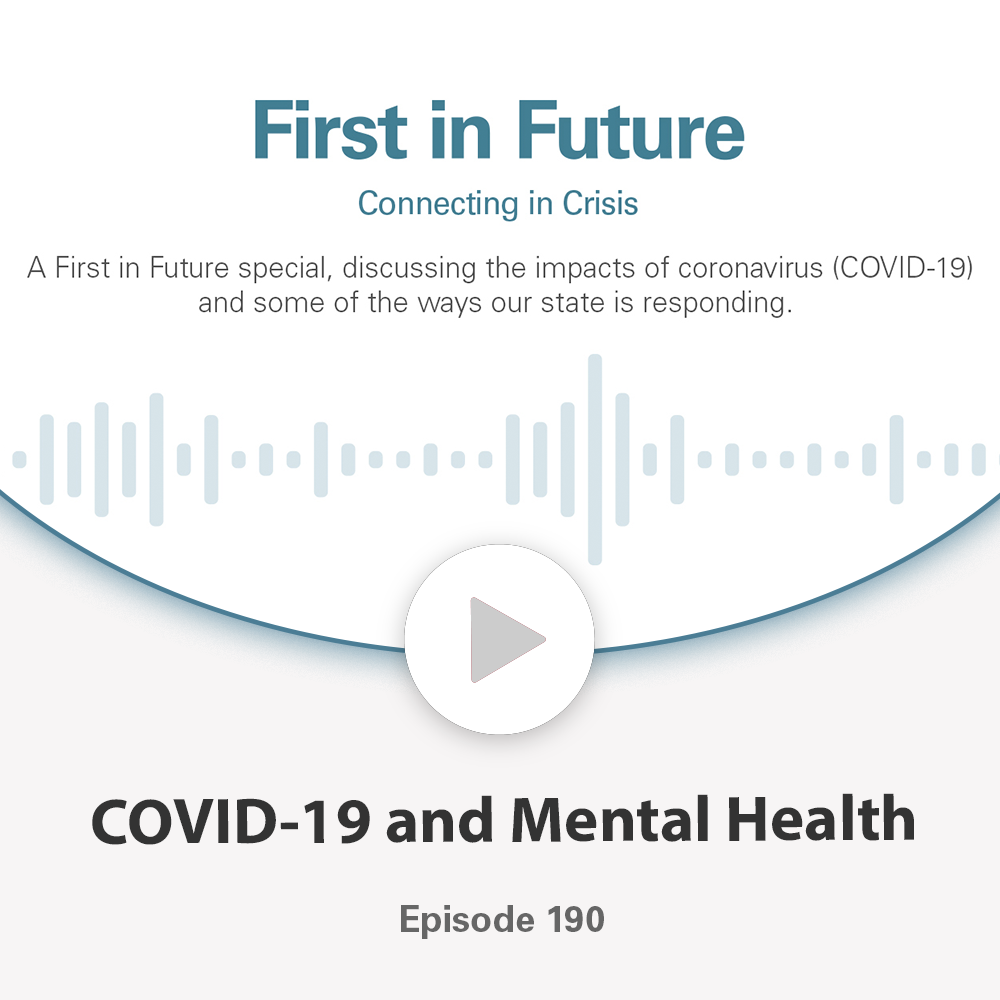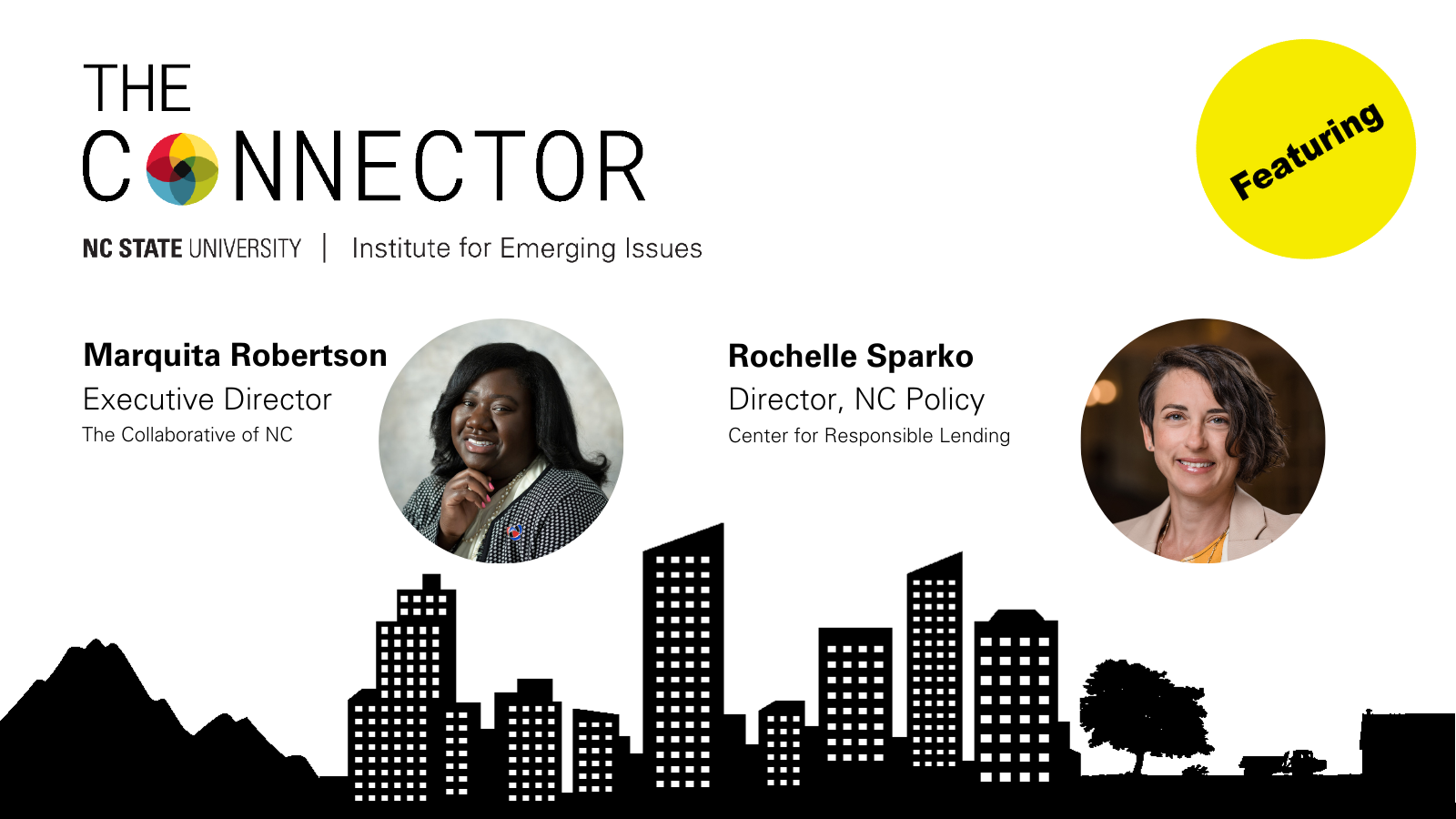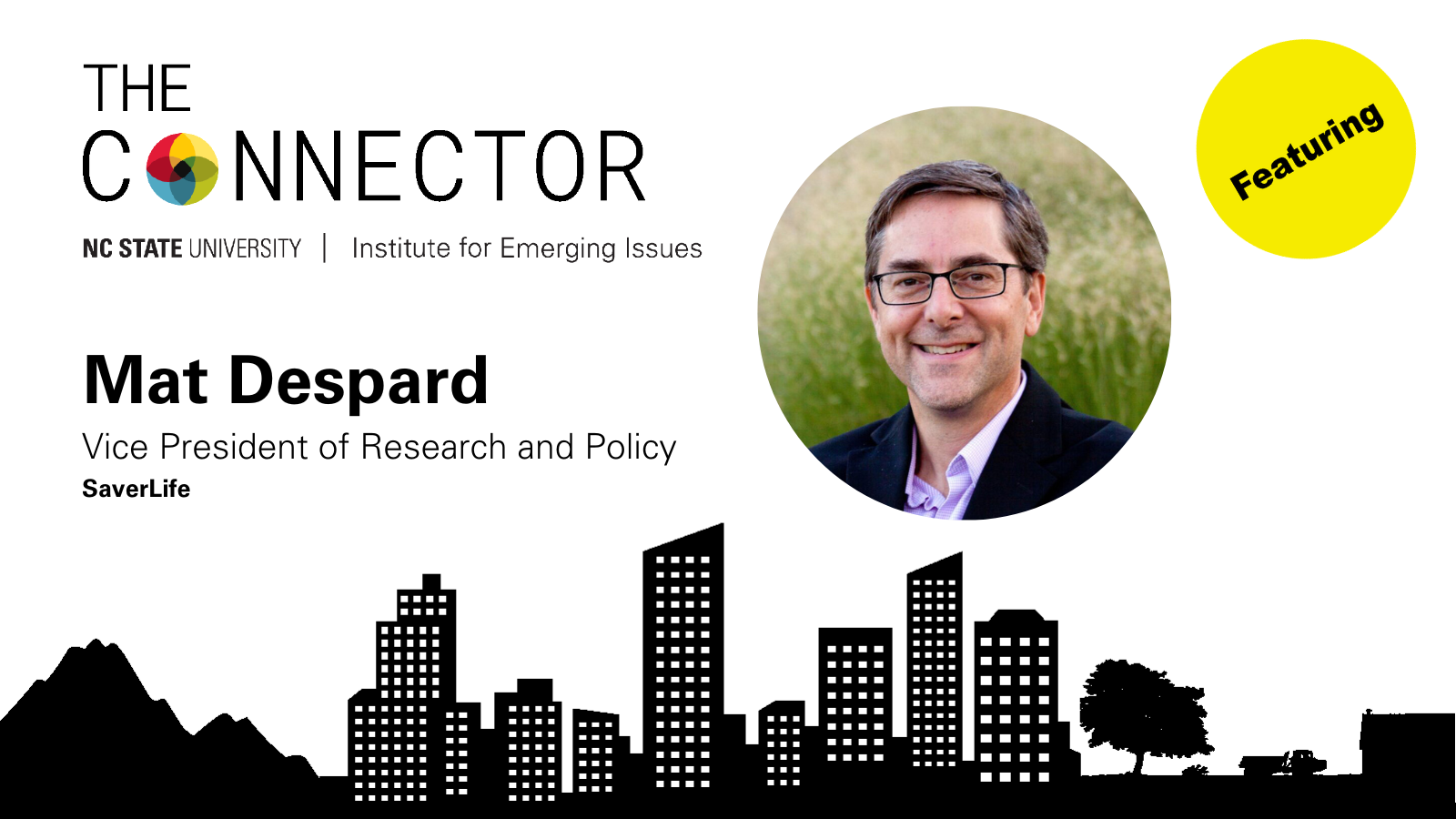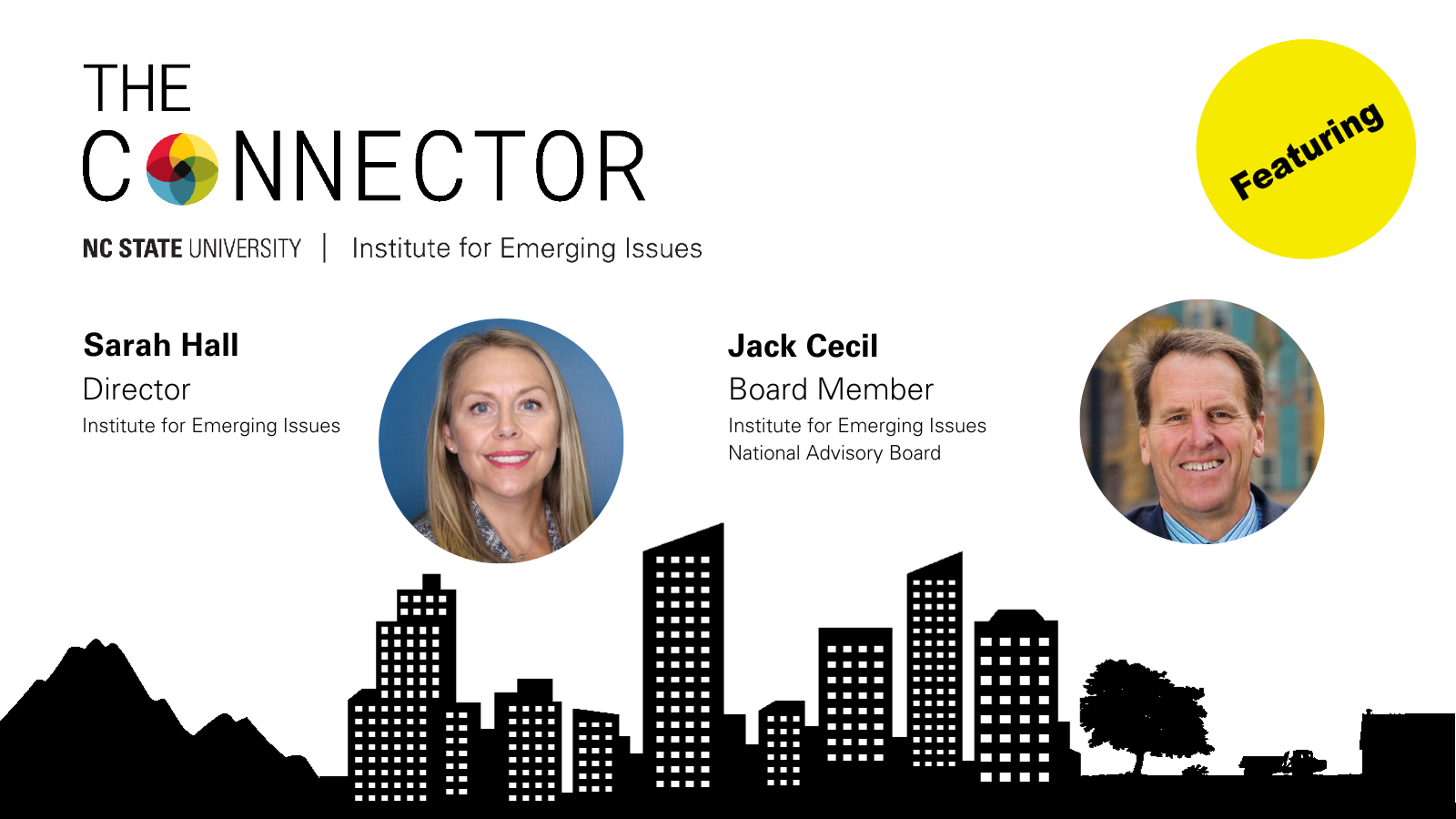First in Future: COVID-19 and Mental Health

 Summary: Leslie Boney, Director of the Institute for Emerging Issues, hosts a series of virtual conversations discussing the impacts of coronavirus (COVID-19) and some of the ways our state is responding.
Summary: Leslie Boney, Director of the Institute for Emerging Issues, hosts a series of virtual conversations discussing the impacts of coronavirus (COVID-19) and some of the ways our state is responding.
Join us for this episode (COVID-19 and Mental Health) with guests Dr. Carrie Brown, M.D., MPH (CMO, Behavioral Health and IDD, DHHS), Dr. Kate Hobbs Knutson, M.D., MPH (Chief of Behavioral Health, Blue Cross Blue Shield NC) and Dr. Marc Grimmett, Ph.D. (Associate Professor of Counselor Education, College of Education at NC State University and Co-Director, NC State Community Counseling, Education, and Research Center).
*This episode of First in Future was recorded on Thursday, May 14th, and reflects information that was up-to-date at that time.*
View the slides here.
Listen to the podcast or Watch Zoom Video
Highlights & Resources
Context
- In normal circumstances, 1 in 5 adults experience a mental health issue; 1 in 25 are considered serious. 1 in 7 people with mental illness are uninsured.
- Past disaster data suggest that people who go through a pandemic could be diagnosed with something resembling PTSD – secondary effect of crisis.
What do we know about mental health challenges now?
Dr. Brown: It’s an extraordinary event—it’s normal to see increases in stress, anxiety, and difficulty sleeping. We’re concerned about increases in suicide, domestic violence, child abuse, and substance use disorder. It’s okay to reach out for help; don’t struggle in silence. NC DHHS is trying to make resources available by telehealth and crisis lines.
What’s showing up in insurance data/claims?
Dr. Knutson: There’s typically a 3-month lag before we see any difference in claims. We’re seeing uptick in use of telehealth for treatment of behavioral health conditions, which is encouraging.
How did CCERC pivot to virtual services?
Dr. Grimmett: Before the pandemic, we were seeing 130 clients per week in person at centers. We needed to continue to provide those services. Several graduates of the counseling program were practicing distance counseling, and we were able to get staff trained quickly and transition into providing distance counseling services.
What do we need to be on the lookout for?
Dr. Brown:
- Self-care becomes more important. Learn new techniques – breathing exercises, etc.
- A little disruption of sleep is normal. If you’re having suicidal thoughts, if your irritability, anger, or aggression with family is increasing, if your use of illicit substances or alcohol is increasing – reach out.
- “The entire world is experiencing stress and anxiety and depression and the opportunity for empathy and for understanding others with mental health conditions is there if we choose to take it.”
What system challenges are we seeing?
Dr. Brown:
- Challenges in making the system work in a telehealth format. 700,000 people in NC don’t have access to broadband. Many behavior health & IDD providers are small businesses, and this is a hard time for small businesses to stay afloat. Staffing challenges for state-operated facilities and direct care providers in communities. Key has been communication and increasing flexibility wherever we can.
- Hopeful that the push to telehealth will increase access—it’s more efficient and it’s a workforce multiplier.
Resources available:
- Hope4NC: 1-855-587-3463 – connects North Carolinians to supports that help them cope and build resilience
- Hope4Healers: 919-226-2002 – tailored for healthcare professionals and their families, including childcare workers
Do you see this as a pivot time for people in NC to realize that mental health challenges are something that everyone can experience?
Dr. Knutson: This is an opportunity to be more open and honest and acknowledge the incredible stress we’re under. There are so many barriers to receiving treatment – stigma, transportation, appointment scheduling, insurance, time off work, etc. This is a major opportunity to reduce stigma, making care more convenient & accessible through telehealth.
Can telephonic treatment continue post-COVID?
Dr. Knutson: Potentially. We’re reevaluating every month about what to continue. One issue is that the research shows that behavioral health care delivered by video is as effective as in-person. There’s less research on telephone-only. From a clinical perspective, I gain a lot of the exam by looking at someone’s face – how they’re dressed, groomed, etc. that feeds into clinical evaluation. If I’m doing that by phone, I’m missing a major portion of the exam. We want to make sure the care being delivered is effective and in line with the best research guidelines.
How did you get the idea to start a free counseling service?
Dr. Grimmett: The goal is for everyone to have access to world-class mental health care, particularly if they do not have insurance. We’re able to do that using the skills of masters/doctoral students getting degrees in counseling – as part of training, they can provide services the community needs.
Are you seeing demand going up or down?
Dr. Grimmett: We’re starting to see demand go up through our community partners asking how they can make services easier for clients to access. A client living in a hotel – how does that person get connected to our distance counseling services? Having to figure out with community partners the best way to reach those community members and connect them to our services.
Is there a strategy on a state level to provide services for marginalized communities?
Dr. Brown: Telehealth is a key pillar to increasing access to high quality services. Need to make sure providers are looking at their clients as whole beings – physical health & behavioral health outcomes.
What role do prevention-based services have in the current crisis?
- Dr. Knutson: Early identification and treatment and prevention are key to slowing this pandemic. Efforts to educate people about vulnerability, early identification, and how to get treatment is critical.
- Dr. Grimmett: Our model is focused on wellness. The goal is to prevent people from getting into crisis. One of the outcomes I’m hoping to see from this is that people see counseling like going to the doctor, healthy eating, and exercise.
- We have to communicate and connect with people in those communities so that we can meet their needs. Community members/partners have valuable, specific knowledge that is just as important as the researchers/clinicians. If we don’t have that mutual conversation, empowering people and having a non-hierarchical approach, then we reinforce the same systems that perpetuate inequities.
What about the mental health impact on children?
Dr. Brown: Still gathering data. School has been disrupted – we won’t really see the effects until kids are back in classrooms. We worry about the impact on this generation. “Wouldn’t it be wonderful if part of the impact could be that it’s important that your emotional intelligence and coping skills and self-care are just as important as your academic and financial achievements?”
Resources: Child Mind Institute, National Child Traumatic Stress Network
If you had a magic wand to change one thing, what would it be?
- Dr. Grimmett: Centers like CCERC should not struggle for funding. Hope that our universities would invest more in these university centers that have community partnerships so we can deliver world-class services to everyone, especially people who wouldn’t otherwise have those.
- Dr. Brown: Medicaid expansion. This is our chance to protect this whole generation for the future.
- Dr. Knutson: Increase in telehealth for behavioral health is here to stay – more convenient & effective. It extends the limited supply of behavioral health providers to meet a larger demand.
- Categories:


